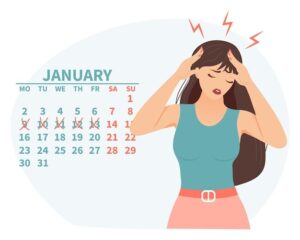This article outlines some common myths and misconceptions around menstruation. Often, these topics are surrounded by stigma, making women feel embarrassed or unheard. By leading honest conversations, we can help normalize such experiences and encourage young girls and women of all ages to be proactive with their health.
The article provides valuable information and creates a space where women feel understood and empowered to seek the support they need. If someone is struggling with symptoms or confusion, they will know they are not alone and that expert guidance is just a step away. If you’re looking for PMS wellness coaching support in Melbourne, PMDD wellness coaching support in Melbourne, or menstrual health coaching in Melbourne, the right support can help you navigate these challenges with confidence and clarity.
Myth 1: Menstrual pain is exaggerated
The Myth: Period cramps are mild and women who complain about them are just being dramatic.
The Truth: Menstrual pain is real and can be severe.
For some women, period pain and cramps can feel as intense as a heart attack. Conditions like endometriosis and PCOS (polycystic ovary syndrome) can make cramps unbearable, yet many women’s pains are dismissed by society, workplaces, and even healthcare providers.
Normalizing conversations about menstrual pain ensures that women receive the medical support they require, instead of being told to ‘just take a painkiller and carry on.’
Myth 2: Menstrual blood is dirty or impure
The Myth: Period blood is unhygienic and should be hidden at all costs.
The Truth: Menstrual blood is just blood—mixed with the uterine lining and natural fluids.

Some cultures still isolate menstruating women or forbid them from entering religious spaces because they are considered “unclean.” This belief fuels period stigma and prevents open discussions about menstrual health.
No one should feel ashamed of their own body. Periods are a natural process, not something to be hidden.
Myth 3: PMS (premenstrual syndrome) makes women irrational
The Myth: Women’s mood swings shift too often. They become overly emotional, unreasonable, or even aggressive before their periods.
The Truth: PMS is real, but it does not mean women are “crazy.”

Hormonal fluctuations can cause mood swings, fatigue, and irritability, but that does not mean women lose their ability to think rationally. This stereotype is often used to dismiss women’s opinions, both at home and in the workplace.
Recognizing PMS as a biological process (not an excuse to invalidate women’s emotions) can lead to better support and understanding.
Myth 4: Menstruation moaning is just complaining
The Myth: Women who express frustration about their periods are just whining.
The Truth: Menstruation can be exhausting—physically and mentally.

Women deal with pain, bloating, fatigue, and mood swings, and often have to power through work, school, and responsibilities as if nothing is happening. Yet, when they express their discomfort, they are often told to “stop complaining.”
Instead of dismissing menstrual struggles, we should acknowledge them and create supportive environments. This can be done through period leave policies, flexible work arrangements, or simply allowing women to express their discomfort without judgment.
Myth 5: Periods should always be regular
The Myth: If your cycle is not exactly 280 days, something is wrong with you.
The Truth: A normal menstrual cycle can range from 21 to 35 days, and it is not always consistent.

Factors like stress, diet, exercise, and underlying health conditions can affect cycle length. Irregular periods are not always a cause for concern, but they should not be ignored either.
Women should feel comfortable discussing their cycles with healthcare providers without fear of judgment or misinformation.
Breaking the cycle of shame
Menstruation is not a weakness, a flaw, or an inconvenience it is a normal and necessary function of the female body. Yet, the stigma surrounding it continues to make women feel embarrassed about something natural.
How We Can Change the Conversation:
✔ Talk about periods openly—with friends, family, and in workplaces.
✔ Challenge misinformation—call out myths when you hear them.
✔ Support menstrual health education—so younger generations grow up informed.
✔ Encourage period-friendly policies—like access to hygiene products and paid menstrual leave.
If you struggle with severe period pain, mood changes, or cycle irregularities, you don’t have to suffer in silence.
Let’s create a plan that works for you. [Book a session today.]
Sources
https://www.healthline.com/health/womens-health/period-myths#Myth-3-It-s-OK-to-dismiss-our-feelings-when-we-re-on-our-period: Myths Around Menstruation
Website: www.period.org: Focuses on menstrual equity, stigma, and advocacy.
https://www.ncbi.nlm.nih.gov/books/NBK565666/: Menstrual Shame: Exploring the Role of ‘Menstrual Moaning’.



